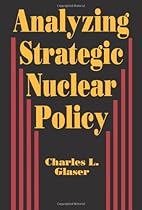Analyzing Strategic Nuclear Policy (Princeton Legacy Library)

| Author | : | |
| Rating | : | 4.89 (779 Votes) |
| Asin | : | 0691023123 |
| Format Type | : | paperback |
| Number of Pages | : | 392 Pages |
| Publish Date | : | 2016-12-17 |
| Language | : | English |
DESCRIPTION:
He is the author of "Analyzing Strategic Nuclear Policy" (Princeton). . Glaser is professor of political science and international affairs at George Washington University. Charles L
He is the author of "Analyzing Strategic Nuclear Policy" (Princeton). About the Author Charles L. Glaser is professor of political science and international affairs at George Washington University.
An important base study book. It is an important book from any point of view whether international relations , nuclear policy , US - Russia comparative studies or understanding how nuclear policy has evolved in the contemporary world to present.
With sweeping changes in the Soviet Union and East Europe having shaken core assumptions of U.S. Glaser's provocative work is organized in three parts. Would any basic alternatives be preferable to MAD? Drawing on the earlier sections of the book, "Decisions in MAD" addresses key choices facing American decision makers.. superiority, and nuclear disarmament. "The Questions behind the Questions" evaluates the basic factual and theoretical disputes that underlie disagreements about U.S. defense policy, it is time to reassess basic questions of American nuclear strategy and force requirements. In a comprehensive analysis of these issues, Charles Glaser argues that even before the recent easing of tension with the Soviet Union, the United States should have revised its nuclear strategy, rejecting deterrent threats that require the ability to destroy Soviet nuclear forces and forgoing entirely efforts to limit damage if all-out nuclear war occurs. "Alternative Nuclear Worlds" compares "mutual assured destruction capabilities" (MAD)--a world in which both superpowers' societies are highly vulnerable to nuclear retaliation--to the basic alternatives: mutual perfect defenses, U.S. Changes in the Soviet Union, suggests Glaser, may be best viewed as creating an opportunity to make re
